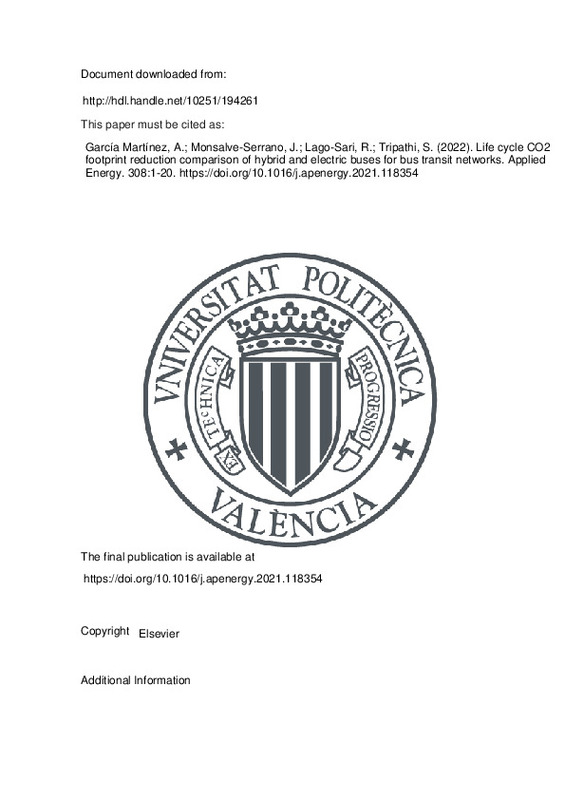JavaScript is disabled for your browser. Some features of this site may not work without it.
Buscar en RiuNet
Listar
Mi cuenta
Estadísticas
Ayuda RiuNet
Admin. UPV
Life cycle CO2 footprint reduction comparison of hybrid and electric buses for bus transit networks
Mostrar el registro sencillo del ítem
Ficheros en el ítem
| dc.contributor.author | García Martínez, Antonio
|
es_ES |
| dc.contributor.author | Monsalve-Serrano, Javier
|
es_ES |
| dc.contributor.author | Lago-Sari, Rafael
|
es_ES |
| dc.contributor.author | Tripathi, Shashwat
|
es_ES |
| dc.date.accessioned | 2023-06-15T18:00:41Z | |
| dc.date.available | 2023-06-15T18:00:41Z | |
| dc.date.issued | 2022-02-15 | es_ES |
| dc.identifier.issn | 0306-2619 | es_ES |
| dc.identifier.uri | http://hdl.handle.net/10251/194261 | |
| dc.description.abstract | [EN] To control the global warming by ensuring the greenhouse gas emissions reduction of the automotive sector, the standards or norms are getting ever stricter globally, specifically in the past few years. In view of this, great emphasis is currently being given to the shift towards electric vehicles. However, it is very important to critically evaluate the overall life cycle of different powertrain technologies. In this study, such analysis has been carried out for the bus rapid transit networks in the 4 largest cities of Spain: Madrid, Barcelona, Valencia and Seville. Ten different lines were selected from each city and their driving-cycles were designed by extracting real time data from GPS used for simulating 3 different bus powertrains (diesel, hybrid and electric) for real-life results of the vehicles on each route. A life cycle analysis of the different bus configurations was done considering a wide perspective from manufacturing, use, maintenance to end-of-life stages, to compare the CO2 footprints of the 3 evaluated powertrains using the database of the software GREET. The CO2 footprints of the electric bus was also estimated for the years 2030 and 2050, using the predictions for cleaner electricity grids for future perspective. Compared to the standard diesel bus results, the overall results for hybrid and electric bus show 40% decrement and 30% increment of CO2 well-to-tank emissions, respectively, 40% and 60% decrement of CO2 life cycle emissions; 30% increment and 60% decrement of the buses' driving range and, 2.5% and 30% addition in the life cycle cost. | es_ES |
| dc.description.sponsorship | The authors acknowledge the Conselleria de Innovacion, Universidades, Ciencia y Sociedad Digital de la Generalitat Valenciana for partially supporting this research through grant number GV/2020/017. Operacion financiada por la Union Europea a traves del Programa Operativo del Fondo Europeo de Desarrollo Regional (FEDER) de la Comunitat Valenciana 2014-2020 con el objetivo de promover el desarrollo tecnologico, la innovacion y una investigacion de calidad. Proyecto IDIFEDER/2020/34, Equipamiento Para El Desarrollo De Plantas Propulsivas Hibridas Limpias Y Eficientes A Traves Del Uso De e -Fuels, entidad beneficiaria Universitat Politecnica de Valencia. | es_ES |
| dc.language | Inglés | es_ES |
| dc.publisher | Elsevier | es_ES |
| dc.relation.ispartof | Applied Energy | es_ES |
| dc.rights | Reserva de todos los derechos | es_ES |
| dc.subject | Bus Rapid Transit | es_ES |
| dc.subject | Diesel | es_ES |
| dc.subject | Hybrid Electric | es_ES |
| dc.subject | Carbon footprint | es_ES |
| dc.subject | Life Cycle Analysis | es_ES |
| dc.subject.classification | MAQUINAS Y MOTORES TERMICOS | es_ES |
| dc.title | Life cycle CO2 footprint reduction comparison of hybrid and electric buses for bus transit networks | es_ES |
| dc.type | Artículo | es_ES |
| dc.identifier.doi | 10.1016/j.apenergy.2021.118354 | es_ES |
| dc.relation.projectID | info:eu-repo/grantAgreement/GV INNOV.UNI.CIENCIA//IDIFEDER%2F2020%2F034//EQUIPAMIENTO PARA EL DESARROLLO DE PLANTAS PROPULSIVAS LIMPIAS Y EFICIENTES A TRAVES DEL USO DE E-FUELS / | es_ES |
| dc.relation.projectID | info:eu-repo/grantAgreement/GENERALITAT VALENCIANA//GV%2F2020%2F062//POTENCIAL DEL USO DE E-FUELS EN PLANTAS PROPULSIVAS HIBRIDAS COMO VIA DE REDUCCION DE LAS EMISIONES DE CO2 DEL SECTOR TRANSPORTE/ | es_ES |
| dc.relation.projectID | info:eu-repo/grantAgreement/GVA//GV%2F2020%2F017 / | es_ES |
| dc.rights.accessRights | Abierto | es_ES |
| dc.contributor.affiliation | Universitat Politècnica de València. Escuela Técnica Superior de Ingeniería del Diseño - Escola Tècnica Superior d'Enginyeria del Disseny | es_ES |
| dc.description.bibliographicCitation | García Martínez, A.; Monsalve-Serrano, J.; Lago-Sari, R.; Tripathi, S. (2022). Life cycle CO2 footprint reduction comparison of hybrid and electric buses for bus transit networks. Applied Energy. 308:1-20. https://doi.org/10.1016/j.apenergy.2021.118354 | es_ES |
| dc.description.accrualMethod | S | es_ES |
| dc.relation.publisherversion | https://doi.org/10.1016/j.apenergy.2021.118354 | es_ES |
| dc.description.upvformatpinicio | 1 | es_ES |
| dc.description.upvformatpfin | 20 | es_ES |
| dc.type.version | info:eu-repo/semantics/publishedVersion | es_ES |
| dc.description.volume | 308 | es_ES |
| dc.relation.pasarela | S\452076 | es_ES |
| dc.contributor.funder | GENERALITAT VALENCIANA | es_ES |







![[Cerrado]](/themes/UPV/images/candado.png)

